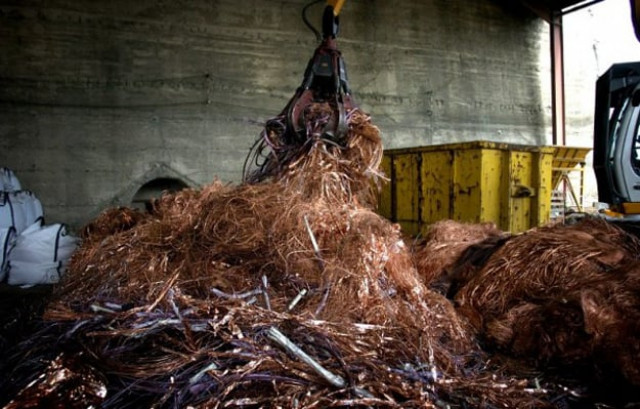South Korea eager to import thousands of tons of copper
Talks under way for free trade accord between the two sides

Talks under way for free trade accord between the two sides. PHOTO: AFP
“South Korea is a major importer of copper ore and it is keen to buy thousands of tons from Pakistan to produce goods for exports,” said Taeyong Thomas Shinn, Chairman of the Korea Importers Association, during a visit to the Islamabad Chamber of Commerce and Industry (ICCI).
South Korea to spend $500m on development projects in Pakistan
Korea’s annual imports stood at around $500 billion, of which 75% were brought by the Korea Importers Association.
Owing to scarcity of natural resources, South Korea banks on the import of huge quantities of raw material to manufacture export products. Pakistan, he said, was producing a lot of raw goods and both countries had enormous potential to enhance trade cooperation.
Despite the huge potential, bilateral trade was far lower, he said and underlined the need for signing a free trade agreement in order to improve two-way commerce.
He also pointed out that the Korean airline was seriously considering starting direct flights to Pakistan, which would help in promoting trade relations.
Focus on education: Enhanced ties with South Korea stressed
Talking to The Express Tribune, a senior official of the Ministry of Commerce revealed that negotiations were under way for striking a free trade accord with South Korea and both sides had undertaken vital studies in that regard.
Pakistan had almost completed the study and was waiting for input from the other side, the official said, adding on the basis of the assessment the two sides would press ahead with the free trade plan.
A joint trade commission has already been established few months ago and under the umbrella of this forum the federal commerce minister visited Seoul and discussed issues of mutual interest.
Pak-South Korea relations: Call for cooperation in energy, infrastructure development
Speaking on the occasion, ICCI Senior Vice President Sheikh Pervez Ahmed briefed the Korean delegation about the export potential of Pakistani products.
He said Pakistan could ship many products such as copper and other ores, textile products, wheat, rice, fruits and vegetables, meat products, surgical items, sports and leather goods.
However, stringent sanitary and phyto-sanitary measures taken by Korea were a major barrier to boosting trade with Korea.
He pointed out that the China-Pakistan Economic Corridor would create plenty of opportunities for investment and joint ventures, especially for infrastructure development and energy projects, and suggested that Korean investors should explore the possibility of injecting capital into these schemes.
Published in The Express Tribune, November 4th, 2015.
Like Business on Facebook, follow @TribuneBiz on Twitter to stay informed and join in the conversation.


















COMMENTS
Comments are moderated and generally will be posted if they are on-topic and not abusive.
For more information, please see our Comments FAQ